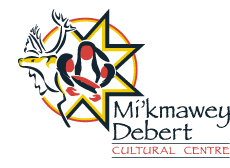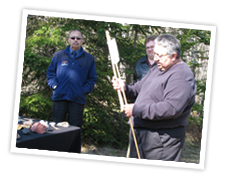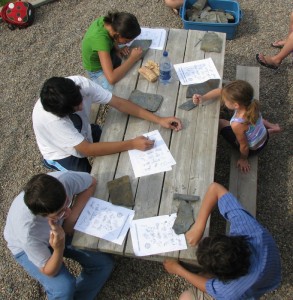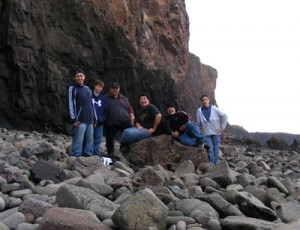Each year artist and cultural educator Gerald Gloade gives workshops, presentations, guided walks, and classroom visits to people of all ages in Nova Scotia. Join Gerald for an outdoor talk at the Mi’kmawey Debert Interpretive Trail, or invite him to speak at your location.
His wide range of topics brings a greater understanding and appreciation of Mi’kmaw culture:
- Kluskap Legends
From his famous battles with Giant Beaver to the amethyst he found on Partridge Island, Kluskap stories tell us about Mi’kma’ki in a memorable and entertaining way.
- Aboriginal Traditional and Ecological Knowledge
Our ancestors’ survival depended on seeing signs and patterns in nature to tell them when it was the best time to hunt, to plant or to prepare for winter. Many of these signs can be seen today, like the silence of crickets preceding the start of fall weather. (Our ancestors knew that when the crickets stopped singing, it was time to dry fish for winter, because the humidity was out of the air.) - Mi’kmaw Art and Craft
From drawing, painting and quill-work, to beadwork, canoe-making, drum-making and basketry, the Mi’kmaq have a distinct style and a rich artistic heritage. This topic can be “hands-on” or done as a presentation. - History of Mi’kmawey Debert
Glaciers and giant beavers! The ancestral sites in Debert, Nova Scotia, date back more than 11,000 years, (the oldest directly-dated sites in Canada) and tell us about our ancestors and the ice-age climate they lived in. The style of tools and the materials they are made of are keys to our understandings. - Geology in Mi’kma’ki and its tie to Mi’kmaw Culture
Our ancestors made tools from rocks and minerals found in specific places in Mi’kma’ki, and lived through catastrophic weather events and changes to our landscape. Stories passed from one generation to the next help share and preserve the knowledge of our land and our past. - Mi’kmaw Spirituality, Governance, and other aspects of Culture
By learning more about past and present Mi’kmaw culture, we gain a better understanding of what it is to be Mi’kmaw today. - Primary to Grade 9 curriculum topics
The MDCC project has developed a rich and engaging curriculum resource that provides content and teaching strategies for three subject areas: Healing, Contemporary Issues and Netukulimk. For each subject there are core activities, extension activities and resource materials. Gerald can help teachers introduce any of these units and/or work with teachers on how they can best utilize these creative and thoughtful units. You can find the curriculum here. - High School curriculum topics
Gerald is a guest presenter on topics like petroglyphs (Mi’kmaw communication symbols), traditional dance and music, drumming or drum-making, art with traditional materials and natural dyes, and painting – as part of the Nova Scotia Grade 10/11 Mi’kmaw studies program.
Gerald has experience working with students from Elementary to High School, plus government and non-profit organizations, private businesses and community groups.
To discuss your group’s area of interest, please contact Gerald Gloade at gerald@cmmns.com or by phone (in Truro, NS) at (902) 895-6385 ext. 280, or call toll free at 1-877-892-2424.






 sharing our stories
sharing our stories
[…] information about the Mi’kmaw people. The site features information on the future centre, educational resources, audio translations in Mi’kmaq, video content such as stories from Mi’kmaw elders and […]
Looking to bring a group of students from Halifax West! Loved your presentation @ SSTA this year.
Hi Liz,
Great! You can call to schedule with Gerald at 902 895 6385, or via email at gerald@cmmns.com.
MDCC Staff
wonderful website!
I have been reviewin online more than ten hours today for calgary painter
calgary & Education and Outreach , yet I never found any interesting article like yours.
It’s pretty worth enough for me. In my view, if all website owners and bloggers made good
content as you did, the net will be a lot
more useful than ever before.
Hello there!
Thank you so much for your kind review. We appreciate when viewers find our website useful.
Have a great day!
hi,
I am seeking as much information as I can on Apiknajit. I had to get up before dawn Feb 1 to feed the month and a prayer. Not much info or stories out in the web. If you can share some that would be great.
Hi Matilda. Each year we post a little piece about Apuknajit on our social media platforms. Please feel free to check out our most recent post on either Facebook or Instagram. Wela’liek.
Hey there! We would love to bring 2 youth groups up (7-10 students each, grades 10-12) this summer to learn about Indigenous Ecology. Any chance we could chat more?
Hi Melanie,
Our Centre isn’t open yet but our Interpretive Trail is. Your best bet would be to reach out to Gerald Gloade to see about booking an education session(s) on location at the trail. He is our Program Development Officer. His email is gerald@cmmns.com – hope this helps.
Wela’liek, the team at MDCC.
Hi I teach grade 2/3 in Dartmouth and would love a lesson virtually I should say, on Mi’kmaq medicine or something to do with plant life. We are going to be doing your jellyfish lesson which is awesome as well as the egg carton one. Can you get back to me at macleodl@gnspes.ca
Hi Lisa,
Wela’lin for reaching out. We are so glad that you have found value in our teaching resources. If you are interested in scheduling a virtual teaching session, please contact Gerald Gloade at gerald@cmmns.com. Good luck with your endeavours and if you have any other questions, please feel free to reach out.